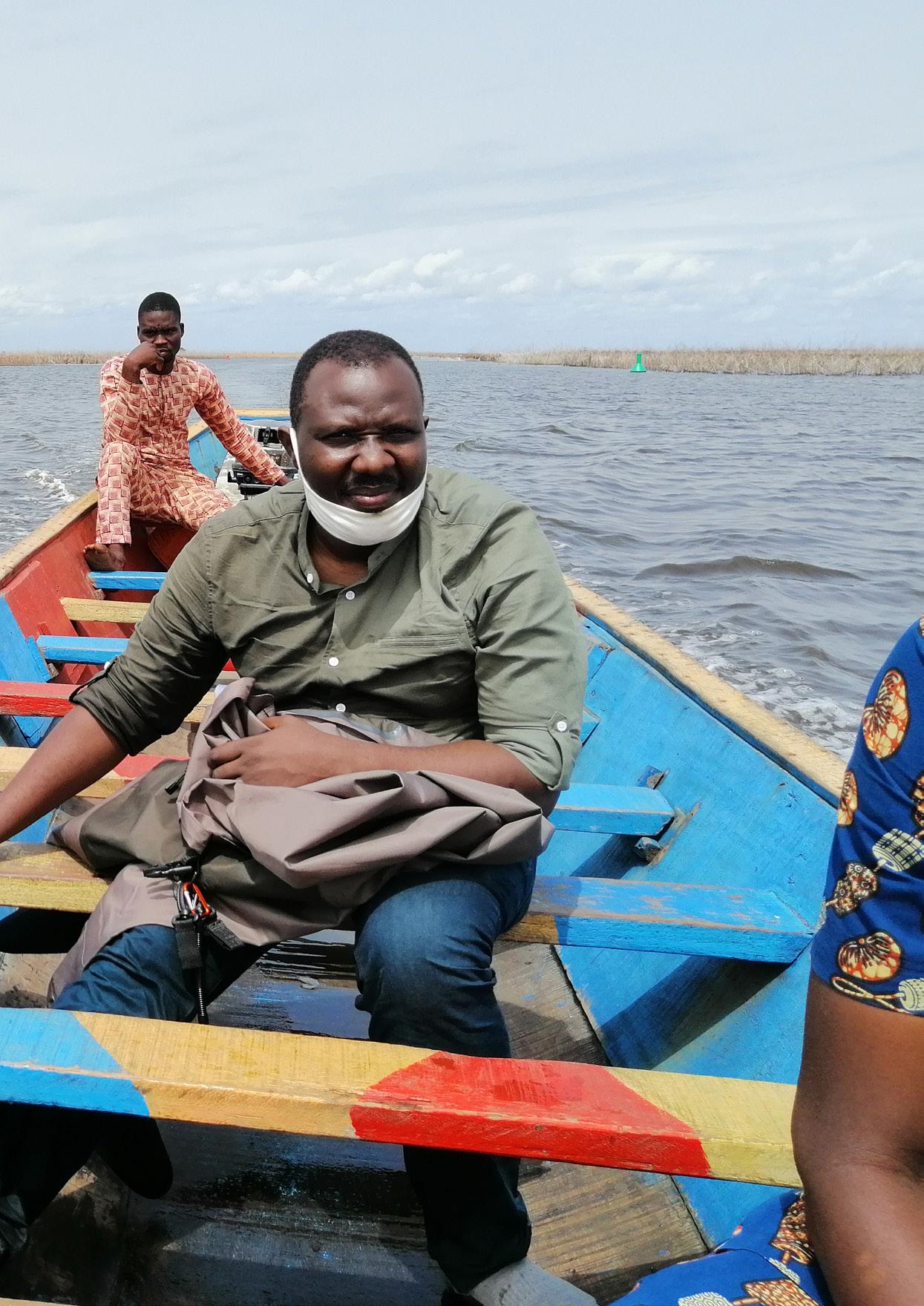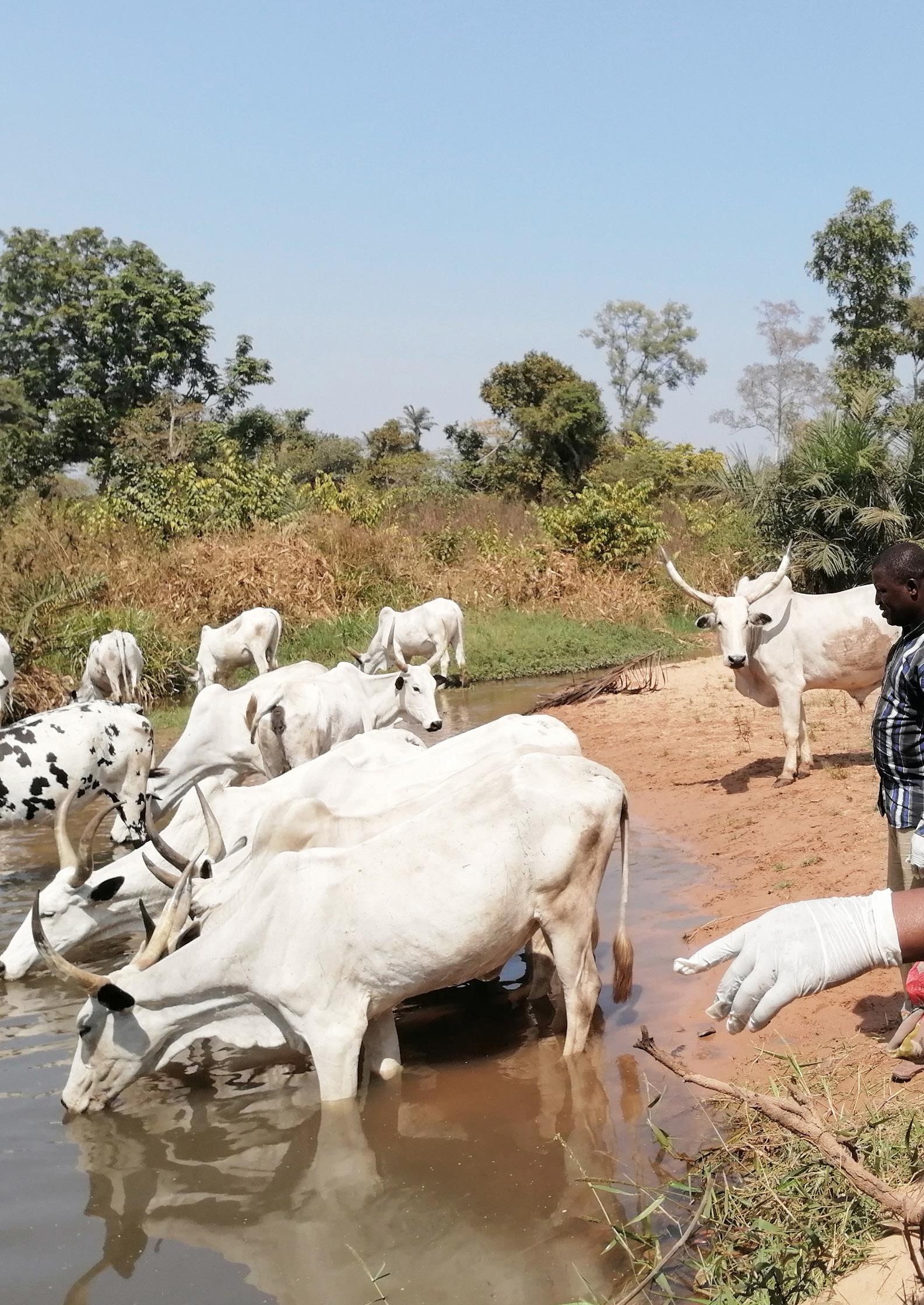
7 minute read
Capacity-enhancing support
by IFS
CAPACITYENHANCING SUPPORT
It is a declared objective of IFS to improve planning of relevant research by early career scientists in Low- and Lower-Middle-Income Countries (LLMICs). We aim to do this by:
> Providing un-bureaucratic granting opportunities and capacityenhancing support to early career scientists to do research in LLMICs > Recruiting and using numerous independent reviewers > Attracting large numbers of applicants > Providing all applicants with detailed feedback, and > Holding dedicated training, supporting alumni to associate, supporting others planning research, and empowering other research councils to do the same.

IFS Continues Its Role as a Valuable Scientific Partner
In 2020, IFS was jointly engaged in 13 virtual events with a variety of strategic partners across a spectrum of topics, including communication to a non-scientific audience, COVID, food security, freshwater tenure rights, “soft skills” for scientists, water and agricultural systems, and women in science. In addition, we provided mentoring support to the ongoing research projects of 433 grantees, along with those finishing up 72 individual and 40 collaborative grants from 2016. We also supported our alumni to associate and support other potential grantees through training and coaching. The four events which IFS organised were:
Webinar on Investing in Future Scientists: Supporting Women Grantees (October)
Arranged with the 47 women grantees of the 2020 grant application call, the aim of the webinar was to activate the group and introduce the IFS gender group to them. The participants were congratulated on their grants. We introduced the new strategy and talked about what we hope the online group platform will be used for in the future and encouraged the group to start new initiatives. The IFS Gender Strategy was introduced with some background on why it is important to support women in science and how IFS is pursuing that.
IFS Alumni Webinar on Investing in Future Scientists in Africa Post-COVID-19 (October)
Recognising the importance of designing recovery strategies in a post-COVID world, the IFS Alumni Associations in Africa – together with the IFS Secretariat – are embarking on a series of online consultative meetings, in collaboration with representatives of other regional scientific communities and stakeholders in Africa and globally. (See the Alumni section for more information.)
IFS-OPCW Joint Workshop on Toxic Chemicals in the Environment: From understanding pollution and its impact to removal and verification techniques (November)
IFS grantees from seven African and Asian countries presented their research findings at this workshop co-organised by IFS and one of its partners, the Organisation for the Prohibition of Chemical Weapons (OPCW). Alongside IFS grantees whose research grant had been jointly co-funded by IFS and OPCW, presenters were holders of an OPCW grant, some of whom had received an IFS-OPCW grant earlier in their scientific career also. Additionally, the meeting was attended by IFS and OPCW scientific advisors as observers and by IFS and OPCW technical staff. The workshop not only offered a unique opportunity for scientists from around the globe to network and to get a glimpse of how similar problems may be tackled differently at local scale in different settings, but it also allowed the two organisations to gain additional ideas on how to develop their partnership.
IFS 1000 STEM Women Workshop (December)
The IFS 1000 STEM Women Workshop brought together 23 IFS women grantees from Africa, Asia and Latin America to develop their science communication skills in an interactive workshop co-organised by IFS and Doane University. The goal of the workshop was to create 90-second videos for the 1000 STEM Women Project, a database of videos created by women working in the fields of Science, Technology, Engineering and Maths (STEM) all over the world, to increase the visibility of women role models for school children. Participants interacted with each other and practiced creating videos using Flipgrid, an online education tool that facilitates asynchronous online discussions. Once finished, participants’ videos were added to the 1000 STEM Women Project.
IFS also participated and contributed to nine events organised by others, including (descriptions follow): > Resilience of Vulnerable Populations and COVID-19 > 75th United Nations General Assembly (UNGA) “Transformations Within Reach” > Role of Science and of Science Funders in the Time of the
COVID-19 Crisis > Redirecting Global Agriculture Subsidies for a Sustainable
Food Future > Whose Water? Global Launch of a 15-Country Analysis on the Status of Indigenous Peoples’, Afro-descendants’ and
Local Communities’ Legally Recognised Freshwater Tenure
Rights > ILRI CapDev Grand Challenge > Recovery, Reactivation and Resilience: Sustainable food security in a post-COVID World > Scaling Resilient Water and Agriculture Management Practices for Sustainable Rice Intensification in East Africa > Seminar Presentation of the Swedish University of Agricultural Sciences’ Vietnam Evaluation
Resilience of Vulnerable Populations and COVID-19 (May)
Organised by the World Resource Institute, this webinar was attended by a diverse group of speakers representing vulnerable frontline communities, international aid agencies and resilience experts, along with the Global Commission on Adaptation. They discussed questions of: How can response and recovery to COVID-19 build longer-term resilience to enable communities and countries to better prepare for future health and climate risks? What actions are needed to help countries and communities build back better to create jobs, improve economic security, and fill development deficits?
75th United Nations General Assembly (UNGA) “Transformations Within Reach” (June-September)
The International Institute for Applied Systems Analysis (IIASA) and the International Science Council (ISC) initiated the Consultative Science Platform to explore the humanitarian and socio-economic crisis triggered by the COVID-19 pandemic and considerations for enabling sustainable development paths during the recovery process. It was hosted by Norway as part of the IIASA-ISC Consultative Science Platform, with a focus on the themes of resilient food systems, sustainable energy, science systems and governance for sustainability. The initiative was guided by an advisory board under the patronage of HE Ban Ki-moon, former UN Secretary General, and chaired by HE Mary Robinson, Chair of The Elders, Patron of ISC and former President of Ireland. IFS was also present at a side event in October at the 2020 Borlaug Dialogue, organised by the World Food Prize Foundation. IFS also gave substantial feedback on the draft report before it was published. It is envisaged that the consultative platforms and the report will stimulate further dialogue to help identify applied research initiatives.
Role of Science and of Science Funders in the Time of the COVID-19 Crisis (June)
This webinar was hosted by the International Science Council, where dialogue took place on identifying critical COVID-related knowledge gaps and fostering potential collaboration and synergies; understanding the impacts of the COVID-19 pandemic on science funders; potential longer-term implications of the pandemic for global science systems; and ways of enabling science to respond more effectively to future similar threats.
Redirecting Global Agriculture Subsidies for a Sustainable Food Future (August)
Organised by the World Resource Institute (WRI), this webinar explored key questions of what is needed and where agricultural subsidies are currently going, and how to put subsidies to better use.
Whose Water? Global Launch of a 15-Country Analysis on the Status of Indigenous Peoples’, Afro-descendants’ and Local Communities’ Legally Recognised Freshwater Tenure Rights (August)
IFS has been contributing to discussions of the report entitled Whose Water? on national laws and regulations recognising indigenous peoples’, afro-descendants’, and local communities’ water tenure rights. The analysis stems from a collaboration between the Environmental Law Institute and the Rights and Resources Initiative. The webinar discussed the innovative methodology and comparative assessment on the extent to which the national-level legal frameworks of 15 countries across Africa, Asia and Latin America recognise communities’ and community women’s rights to use, govern and protect their freshwater resources.
ILRI CapDev Grand Challenge (September)
IFS presented its new strategy in relation to the launching of ILRI’s CapDev Grand Challenge, a process to unlock young researchers’ and scientists’ potential. It is designed to equip young professionals with the requisite leadership and people skills, commonly referred to as soft skills. These will enable them to overcome the major bottlenecks in their future career progression. A new MOU with IFS has been signed to work together on some key challenges hindering young professionals’ career progress. Under this new agreement, ten IFS grantees were selected to join the ten-month capacity-enhancing course in 2021.
Recovery, Reactivation and Resilience: Sustainable food security in a post-COVID World (September)
Organised by SIANI/IFAD, this online forum discussed sustainable and food-secure recovery from the COVID-19 pandemic through transformative structural change.
Scaling Resilient Water and Agriculture Management Practices for Sustainable Rice Intensification in East Africa (September)
Organised by the Global Framework on Water Scarcity in Agriculture (WASAG), and hosted by FAO’s Land and Water Division, the webinar presented the framework of the research project scaleWAYS (Scaling out Resilient Water and Agricultural Systems), which is being jointly implemented by the International Institute for Applied System Analysis (IIASA), the Lake Victoria Basin Commission (LVBC) and the International Crops Research Institute for Semi-Arid Tropics (ICRISAT), with financial support from the Austrian Development Agency (ADA).
Seminar Presentation of the Swedish University of Agricultural Sciences’ Vietnam Evaluation (September)
The seminar highlighted results and lessons from Swedish University of Agricultural Sciences (SLU) collaborations in Vietnam from 1977-2018, and also discussed the importance of international collaborations to tackle current global challenges. Participants included Vietnam’s Ambassador to Sweden and Sweden’s Ambassador to Vietnam, as well as representatives from SLU, and several universities and research institutions in Vietnam.









